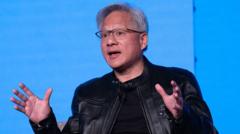Will Nvidia Reopen AI Chip Sales to China?

The Resumption of Nvidia's AI Chip Sales to China: A Strategic Shift in the Tech Landscape
In a significant development within the technology sector, Nvidia, the US technology giant renowned for its advanced graphics processing units (GPUs) and artificial intelligence (AI) chips, has announced plans to resume sales of its high-end AI chips to China. This decision comes on the heels of assurances from the US government regarding the issuance of necessary licenses, a move that could reshape the dynamics of the ongoing tech rivalry between the United States and China. With both nations navigating the complexities of trade relations, this article delves into the implications of Nvidia's decision, the background of US export controls, and the broader context of AI development in both countries.
Understanding Nvidia's Position in the Market
Nvidia has positioned itself as a leader in the AI chip market, with its products being instrumental in powering a variety of applications, from data centers to autonomous vehicles. Given the explosive growth of AI technologies, the demand for high-performance chips has surged, making Nvidia's offerings particularly valuable. The company's decision to target China—one of its largest markets—reflects its strategic intent to capitalize on the country's burgeoning AI ecosystem.
The Role of US Export Controls
The landscape of chip exports to China has been heavily influenced by US government policies aimed at safeguarding national security. The Trump administration implemented stringent export restrictions in 2023, particularly concerning advanced technologies that could potentially bolster the Chinese military. These restrictions were a response to growing concerns over the technological capabilities of China, particularly in AI and semiconductor manufacturing.
- H20 Chip Development: The H20 chip was specifically developed for the Chinese market in response to US export restrictions, positioning Nvidia to cater to local demands while navigating regulatory hurdles.
- Bipartisan Concerns: Both the Trump and Biden administrations have expressed caution over the transfer of sensitive technologies to China, underscoring the bipartisan nature of concerns regarding national security.
The Easing of Trade Tensions
The announcement of Nvidia's resumed sales comes amid a backdrop of easing trade tensions between Beijing and Washington. In recent months, both governments have taken steps to alleviate some friction, leading to discussions on tariffs and trade policies. Here are some key developments that have contributed to this thawing relationship:
- Tariff Truce: In May, the US and China agreed to a temporary truce in their ongoing tariff war, indicating a willingness to negotiate and find common ground.
- Relaxation of Export Controls: China has begun to loosen restrictions on rare earth exports, a critical resource for technology manufacturing, while the US has lifted restrictions on chip design software firms in China.
The Implications of Nvidia's Resumed Sales
The decision to resume sales of the H20 chip carries several implications for Nvidia, the tech industry, and the geopolitical landscape:
1. Economic Benefits for Nvidia
China represents a substantial market for Nvidia, and the resumption of chip sales could lead to significant revenue growth. By re-entering this market, Nvidia stands to:
- Boost its sales figures and market share in the fast-growing AI segment.
- Strengthen relationships with existing customers and attract new clients in China’s tech ecosystem.
2. Impact on US-China Relations
Nvidia's move may signify a broader trend toward collaborative engagement between the US and China in technology sectors. This development could:
- Encourage other US companies to explore opportunities in China, potentially leading to a more balanced trade relationship.
- Promote discussions around technology sharing and joint innovation efforts, though national security concerns will likely remain at the forefront.
3. AI Development and Competition
The resumption of sales also highlights the competitive nature of AI development between the US and China. As both nations strive for technological supremacy, the availability of advanced AI chips will play a critical role in enhancing research and development capabilities. Key outcomes may include:
- Accelerated AI research initiatives in China, as access to Nvidia's chips will empower local companies to innovate more effectively.
- Increased competition in the global AI landscape, potentially leading to breakthroughs in various fields such as healthcare, transportation, and finance.
Nvidia's Leadership and Strategic Advocacy
Jensen Huang, Nvidia's CEO, has been actively advocating for a resumption of chip sales to China, emphasizing the importance of AI in driving productivity and innovation. His efforts have included:
- Engaging with government officials in both the US and China to articulate the benefits of collaboration in AI development.
- Reaffirming Nvidia's commitment to job creation and technological leadership in the US while fostering growth opportunities in China.
Understanding the Broader Tech Ecosystem
The tech landscape is undergoing rapid transformation, driven by advancements in AI, machine learning, and data analytics. Companies like Nvidia are at the forefront of this evolution, and their strategic decisions will have lasting effects on global technology trends. Key factors include:
- The rise of AI-driven applications across various industries, necessitating high-performance computing resources.
- The growing significance of ethical considerations in AI development, particularly regarding data privacy and algorithmic bias.
Looking Ahead: Future Prospects for Nvidia and AI in China
As Nvidia prepares to re-enter the Chinese market, the future holds both opportunities and challenges. The company must navigate the complexities of regulatory frameworks while leveraging its technological prowess. Considerations for the future include:
- Innovation and R&D: Continued investment in research and development will be crucial for Nvidia to maintain its competitive edge and drive advancements in AI technologies.
- Collaboration Opportunities: Exploring partnerships with Chinese companies could lead to mutually beneficial outcomes, fostering innovation while addressing regulatory concerns.
Conclusion: A Pivotal Moment in AI Technology
Nvidia's decision to resume sales of its AI chips to China marks a pivotal moment in the ongoing tech rivalry between the US and China. As the landscape of technology continues to evolve, the implications of this decision will reverberate across industries and influence the future of AI development. By fostering collaboration and innovation, both nations can harness the potential of AI to drive economic growth and improve quality of life. The journey ahead will undoubtedly be complex, but it also presents a unique opportunity for dialogue and progress in the global tech ecosystem.
FAQs
What are the H20 chips developed by Nvidia?
The H20 chips are high-performance AI chips designed specifically for the Chinese market. They are pivotal for applications in data centers and AI research.
Why did the US impose export restrictions on AI technology to China?
The US imposed export restrictions due to concerns that advanced technologies could be used by the Chinese military, highlighting national security issues.
What does Nvidia's resumption of sales mean for US-China trade relations?
Nvidia's resumption of sales may signify a thawing of trade tensions, encouraging further collaboration and negotiation between the two countries in the tech sector.
How does AI impact the global economy?
AI significantly impacts the global economy by enhancing productivity, driving innovation, and creating new markets and opportunities across various industries.
The unfolding narrative of Nvidia's AI chip sales to China serves as a testament to the dynamic interplay of technology, trade, and international relations. As this story continues to evolve, one must ponder: what further implications will arise from the intersection of AI and geopolitics? #Nvidia #AI #TechRivalry
Published: 2025-07-15 06:07:23 | Category: technology



